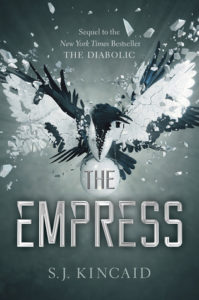I am a pretty big cyborg buff. I love reading about these hybrids and it’s usually all I need to get me hooked into a book. Reading The Diabolic was this entertaining and interesting thought experiment. I had some problems with it – it not living up to its potential – but this sequel tries to fix some of that – with mixed success.
Summary
Tyrus and Nemesis have ascended to the throne. It took time and sacrifices, but they’ve finally made it. Little do they know that the challenges are far from over and it’s not a game of acquiring power, but keeping it. They dream of a future of equality, of personhood, and where science is shared with everyone. But there are those who oppose these ideas, who would use their knowledge, power, and wealth to stop at nothing. Nemesis loves Tyrus and will protect him no matter what, but the rules of the game have changed and she cannot be the brutal killer she once was. She needs to master finesse and diplomatic strategies if she wants to be proven human.
Review
(TW for self harm)
Right off the bat, the exploration of humanity versus inhumanity was intriguing to read about in this book. We are hit with a lot of world building, in a way that feels over handed and dense, but when you sort through these blocks of text, you are left with an issue that brings politics and religion into play. There’s more emphasis on religion in this book than the first, as it is one of the main reasons why Nemesis cannot be seen as human – they say she has no soul. I found the world building to be interesting, but it came in waves, instead of scattered throughout, and this made the pacing feel disjointed.
 The Premise
The Premise
Originally, The Diabolic was going to be a standalone dystopian science fiction novel. But it has since become elongated into a trilogy. Because of that, I feel like this book suffers from this middle slump in many regards. First of all, there’s that same world building problem. Secondly, the pacing for the entire book is strangely slow, and then wildly fast at the end. Almost as if we’ve been in this middle cruise control and at the end we’ve built up to the next sequel.
I am glad that some of the side characters from the first book get more page time in the sequel, and I hope they play an even larger role in the future. Kincaid does a phenomenal job at subverting our expectations and weaving these long standing story arcs. There’s a genuine appreciation for parallels, mirrored events, and timing. No expense or detail is left uncovered in this respect and if you truly love this series, The Empress will be a hit for you.
The Themes
What I enjoyed most, was this intellectual thought experiment. Nemesis has to play all of these games within these books to perform her humanity and her femininity. In the course of this book, her personhood is interrogated and put on the stand. Her journey to figure out herself and her identity is great to witness. Nemesis struggles trying to prove her love and her soul. One of the biggest questions, and is alluded to in the summary, is the conflict between inhuman actions and proving our humanity. As someone who was trained to kill and protect, Nemesis must ironically prove she is ‘more than that’.
Yet this transformation is shadowed by these villainous characters who regularly engage in inhuman actions, genocides, and cruel entertainment. This juxtaposition made for intriguing reading by asking us – who is the better human? How do we maintain our humanity when it requires a sense of inhumanity to rule? These are the type of questions that I love. And they’re exactly what Kincaid manipulates. Where does our humanity lie? In our genetics or in something else entirely?
Another theme that is more thoroughly discussed is love. Love makes us vulnerable, those we love become pawns to our enemies. How do we love in these battle of wills? Do we cut out our feelings? Deny our feelings? Love makes us fools, sometimes blindly so, so how will Tyrus and Nemesis’ feelings survive? Does our instinct for protection and self-sacrifice get in the way? When we are in love, we sometimes forget that we are still two separate people. We must remember the lines between us and our identities.
Overall,
There are so many twists and turns and I do understand why we need certain world building information. But as a whole, parts of this book seem extraneous and overhanded. Some plot lines just seem to drag or stretch. It’s impossible to figure out how much is essential without the sequel though. The world of this universe is on the brink of change. And this middle book seems to be the calmer ocean before the storm. (Yet really, things do happen quite quickly, especially at the end, so the first seventy percent are the calmer waters).
All of this said, I will most definitely be reading the sequel for many reasons. 1) We left off on such a cliffhanger that I need to read it. 2) This humanity conflict is the thing that keeps me coming back to the series. 3) I am excited for the side character magic. 4) I hate leaving things unfinished.
This has been a murky review, but if you liked the first, you should read this sequel and if you’re one for debating humanity, especially in some sort of future society, this is something you shouldn’t miss.
You can pick up The Empress on Amazon(US), your local indie, and Goodreads.
Disclaimer: I received this book in exchange for an honest review from Edelweiss.
Discussion
What are your feelings about series that become extended?
Subscribe for more reviews